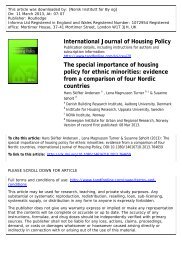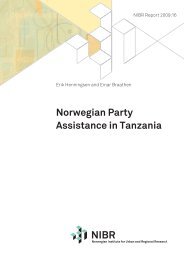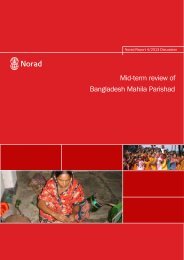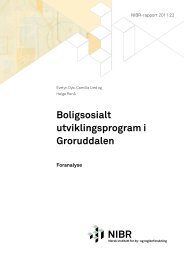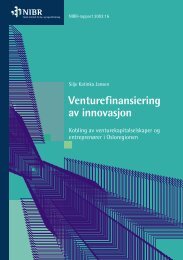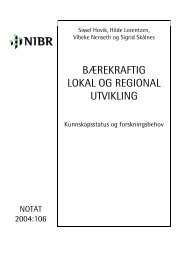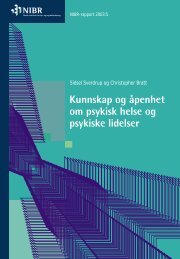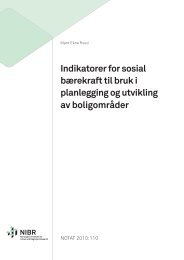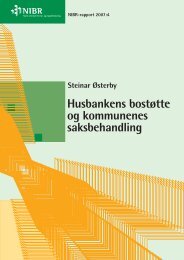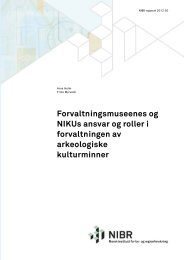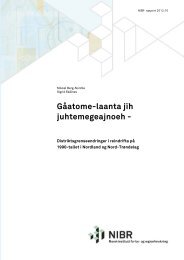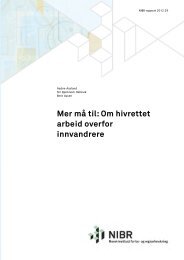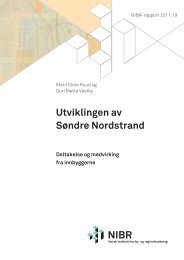Evaluation of the Southern and Eastern Africa Regional Centre for ...
Evaluation of the Southern and Eastern Africa Regional Centre for ...
Evaluation of the Southern and Eastern Africa Regional Centre for ...
- No tags were found...
Create successful ePaper yourself
Turn your PDF publications into a flip-book with our unique Google optimized e-Paper software.
383.6.1 Sufficiently harnessed?Despite <strong>the</strong> activities, <strong>and</strong> especially <strong>for</strong> graduates expressing overwhelmingsatisfaction with <strong>the</strong> course, many respondents did none<strong>the</strong>less suggest that <strong>the</strong>re isan underdeveloped potential in <strong>the</strong> <strong>Centre</strong> exerting its influence.One highly relevant avenue highlighted was that <strong>the</strong> findings in dissertations could bemade better known to maximise potential <strong>for</strong> impact. One observer in governmentdescribed <strong>the</strong> dissertations as a vast <strong>and</strong> latent store with potential <strong>for</strong> use inevaluating policy implementation. The dissertations could be used to monitor whathas actually changed following <strong>the</strong> Maintenance Act, or <strong>the</strong> Sexual Offences Act <strong>and</strong>so on. NGO employees, including Directors, also alluded to added value that suchresearch could add by feeding into better focus <strong>and</strong> strategizing in <strong>the</strong>ir own work.The Deputy <strong>of</strong> <strong>the</strong> <strong>Centre</strong> also identified an additional issue in not following <strong>the</strong>logic <strong>of</strong> <strong>the</strong> grounded approach to its natural conclusion in terms <strong>of</strong> seeking betterimplementation <strong>of</strong> policy <strong>for</strong> women. The risk is that communities suffer researchfatigue in light <strong>of</strong> little improvement evident in <strong>the</strong>ir circumstances despite being‘researched’. These findings tend to suggest two inter-related issues, namely, publicity<strong>and</strong> in association, accessibility, <strong>and</strong> more practical application to scrutinisingimplementation <strong>and</strong> hence directly policy relevant. These are also connected to athird, namely, pr<strong>of</strong>iling <strong>the</strong> <strong>Centre</strong>.Though accessible to some extent through <strong>the</strong> web in recent years, comments byrespondents, as well as <strong>the</strong> evaluators’ own attempts to navigate <strong>the</strong> web site tends topoint towards hard to find <strong>for</strong>mat (listed according to year, <strong>and</strong> not topic, <strong>for</strong>example). Presently, <strong>the</strong> pr<strong>of</strong>iling <strong>of</strong> work does not appear particularly user-friendly.Fur<strong>the</strong>rmore, an additional policy friendly <strong>for</strong>mat could be better utilised bystakeholders who may not have time or inclination to read full length dissertations.Some follow-up in terms <strong>of</strong> direct relevance to communities is also desirable.It is fair to say that <strong>the</strong> <strong>Centre</strong> is active mainly if not almost entirely in Zimbabwe<strong>and</strong> not in <strong>the</strong> regional countries. One finds that <strong>the</strong> graduates are relatively wellnetworked in Zimbabwe but this decreases <strong>the</strong> fur<strong>the</strong>r one moves awaygeographically as explained by <strong>the</strong> previous comment in Zambia that ‘we do not see<strong>the</strong> impact <strong>of</strong> graduates’. The need <strong>for</strong> strategic interventions <strong>for</strong> alumnae wasparticularly felt in Zambia <strong>and</strong> Kenya.But what is reasonable to ask <strong>of</strong> <strong>the</strong> <strong>Centre</strong> over <strong>and</strong> above its clearly dedicated <strong>and</strong>highly focused attention to <strong>the</strong> course <strong>and</strong> its extra-curricular activities? We listseveral examples <strong>of</strong> elements identified by respondents in survey <strong>and</strong> interviews as<strong>the</strong> sorts <strong>of</strong> ideas that could potentially feed into a more strategic outreach to bedetermined by SEARCWL. Some <strong>of</strong> <strong>the</strong>se may not necessarily dem<strong>and</strong> moreresources, o<strong>the</strong>rs may:−−−Should do more training with government, <strong>and</strong> women in private practiceMore outreach (Law Commission)<strong>Centre</strong> could mobilise its research <strong>and</strong> use it strategically: ‘Research is locatedat <strong>the</strong> <strong>Centre</strong> <strong>and</strong> if we don’t get it ourselves <strong>the</strong>n it will stay <strong>the</strong>re’.



